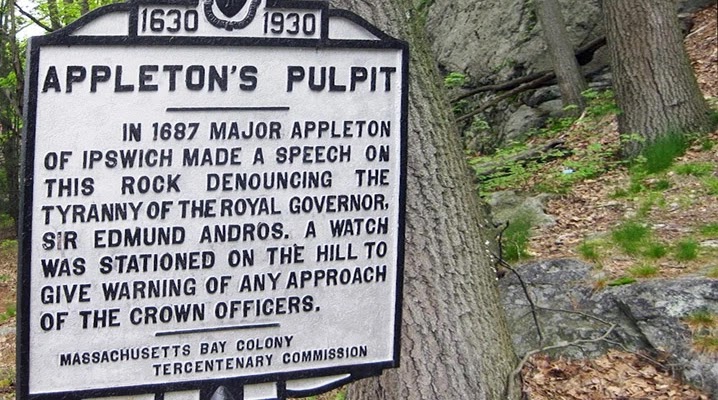
Here is an earlier story of yet more transatlantic kinship. Not long after King James II had been effectively overthrown in England in November 1688 by the arrival of his Dutch son-in-law, Prince William of Orange, the 'colonies' of New England also revolted against James and in favour of William.
James II's place-man in New England was the authoritarian governor Sir Edmund Andros who had been in post since 1686. Tremors had been felt for some time - James II's brother and predecessor Charles II had revoked the charter of the Massachussetts Bay colony in 1684 because the citizenry refused to obey his decrees. So, when news of William's success reached America, the population of the region around Boston and Ipswich saw their opportunity. They organised themselves into provincial militias and began to arrest government officials.
An orange flag was raised on Beacon Hill; there was a public declaration supporting "the noble undertaking of the Prince of Orange". Regular readers might remember that I've posted before about the support for William and Mary in the fledgling Ulster-Scots settlements of Maryland and their November 1689 Address of the Inhabitants of Somerset County (previous post here).
O 20 May 1689 the people of Boston published their first direct address to William (link here); on 6 June 1689 they published a second (link here). Congregational ministers were to the fore in opposing the Anglican establishment. And on 31 May a similar rising took place in New York State, led by Jacob Leisler (link here).
There is a very big story to untangle here, and to connect with events on this side of the Atlantic. From Brixham to Boston to the Boyne has a certain ring to it.
Discovering forgotten international dimensions to what are usually seen as narrow local events are game-changers in understanding, in lifting our view from our own Northern Ireland goldfish bowl to a far wider ocean.
• Signage pics from HistoricIpswich.com








0 comments:
Post a Comment